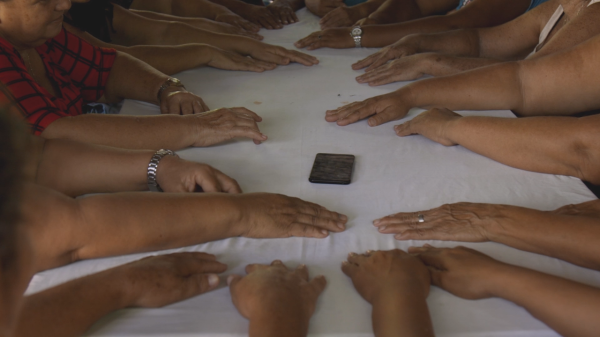
Save this storySave this storySave this storySave this story
When the government of El Salvador declared a “state of exception” in March of last year, after a sudden spike in gang killings, it was supposed to be temporary. Soldiers and police officers could arrest anyone they considered suspicious. No one was entitled to a legal defense. Each month, the country’s Assembly would have to vote to extend this state of affairs. But the party in power, called Nuevas Ideas, held a super-majority. Their fealty to the President, Nayib Bukele, was total, as was his commitment to an indefinite campaign of law and order based on mass arrests.
The state of exception has now been renewed eighteen times. As one journalist put it to me, el régimen de excepción has become la normalidad excepcional, the exceptional norm. In the past year and a half, the government has jailed nearly seventy-three thousand people. At least a hundred and eighty-five prisoners have died in custody, according to the human-rights organization Cristosal. It’s impossible to say how many innocent Salvadorans have been arrested and detained, but there’s little question that ordinary citizens have been swept up despite having done nothing wrong. I spent a week in El Salvador at the very start of the state of exception, and immediately encountered two families who’d lost a father and a son, respectively, to arbitrary detention. When we spoke six months later, they still hadn’t returned. Thousands of Salvadorans are languishing in prison, in many cases without knowing the supposed evidence against them.
The New Yorker Documentary
View the latest or submit your own film.

No place in El Salvador has been spared from the crackdown, even communities that, historically, have never had gang problems. One such town is the subject of “La Isla,” by the Salvadoran filmmaker Amada Torruella. Tucked away in the Jiquilisco Bay, along El Salvador’s southern coast, it’s called la isla El Espíritu Santo, or the Holy Ghost island.
If you’re not one of the thirteen hundred residents of the island, you need permission to get there. On arrival, you must present your I.D., and the person you’re visiting has to vouch for you. This practice dates to the nineteen-eighties, when the country was in the midst of a civil war. Money from one of the island’s coconut coöperatives went toward collective security. Decades later, gang crime overtook towns nearby but never made it onto the island itself. “There aren’t walls, there isn’t barbed wire, and there’s no gang graffiti,” the reporter Carlos Martínez wrote in the news outlet El Faro. “No one can remember the last time someone was assassinated on the island.”
On May 13, 2022, to the shock of the local population, government authorities arrested five lancheros, or boatmen, on the island, later claiming that they were collaborating with the gangs. The boatmen of La Isla perform a vital social service: they are responsible for transporting residents to the mainland and connecting the self-contained world of the island to a wider economy of goods and social services. Over the next several months, the police and Army arrested twenty others from La Isla, bringing the total to twenty-five.
Within days of the first arrests, Torruella arrived on the island. Originally from San Salvador, she travels extensively in the rural parts of the country, making films and teaching media-education classes. The historical legacy of La Isla, as well as its people, drew her there. She wanted to make a film that captured “the absences” that families were experiencing as they lost loved ones to mass arrests. “This film is a portrait of the island,” she told me. Amid the starkness of the national situation, it was the kind of place where “everything is not how it seems.” She said, “If this is what this island is living, if this is what these twenty-five people from the island are living, what is it that thousands of others are experiencing in the country?”
The subjects of Torruella’s film are all female—the wives, mothers, and sisters of the men who have been arrested and sent to prison. “We had just come back from doing some shopping,” one of them says, “when suddenly an officer from the Armed Forces approached him.” She sits on a tidy bed in a small house, sifting through legal papers; her partner has been gone eighteen days. “It’s a lie,” she says, of the government’s accusation. Five months later, she’s still not heard anything from him. “Innocent people are being taken away,” another wife says. “Why not investigate before taking them away?”
What’s most remarkable about Torruella’s film is its counterpoise between the sense of raging injustice and the island’s mystic stillness. La Isla is a lush, beautiful place, with towering coconut trees and quiet lagoons. But it all feels haunted, as though the natural world of the island stands in silent rebuke to the political incursion. The absence of the detained men is practically palpable in the physical landscape. The quiet ripples of water suggest that someone has been swallowed up. The rows of leaves on a fern seem to resemble prison bars. Boats rock in the current, empty and unmanned.
The fallout is literal, too. Overnight, families have lost not only fathers, husbands, brothers, and sons but also entire livelihoods. The electricity has been turned off at one household because of a failure to pay. The outer walls of another home are starting to crumble. In one stunning scene, the women gather around a table and reminisce about their men. The camera is positioned on eye level with the women but focusses on their hands as they flit anxiously on a white tablecloth. Only seven of the twenty-five arrested residents have since been released.
Bukele has managed to do what his predecessors couldn’t: virtually dismantle El Salvador’s rapacious street gangs. Gangsters have gone into hiding or fled the country; for now, crime is down. Bukele’s approval rating, at ninety per cent, is the highest in Latin America and perhaps the world. Leaders across the region—from Argentina and Ecuador to Honduras—have vowed to emulate him. In the U.S., he has earned the praise of Tucker Carlson and Marco Rubio, the Republican senator. This film helps to expose the collateral damage. If innocents are locked up, who can rightly enjoy the peace?
Sourse: newyorker.com







